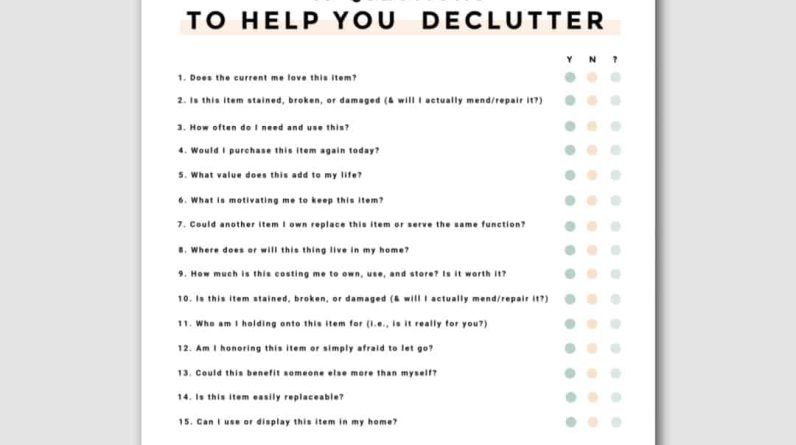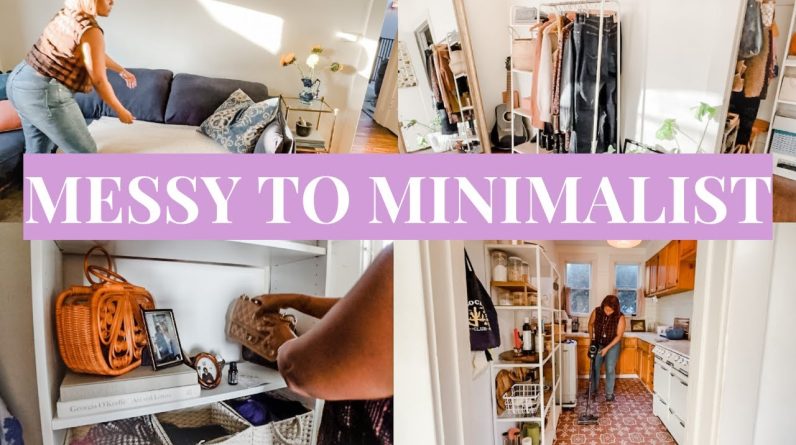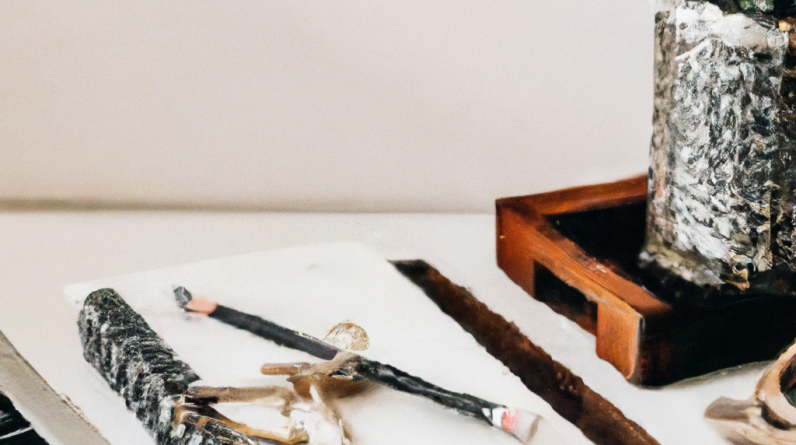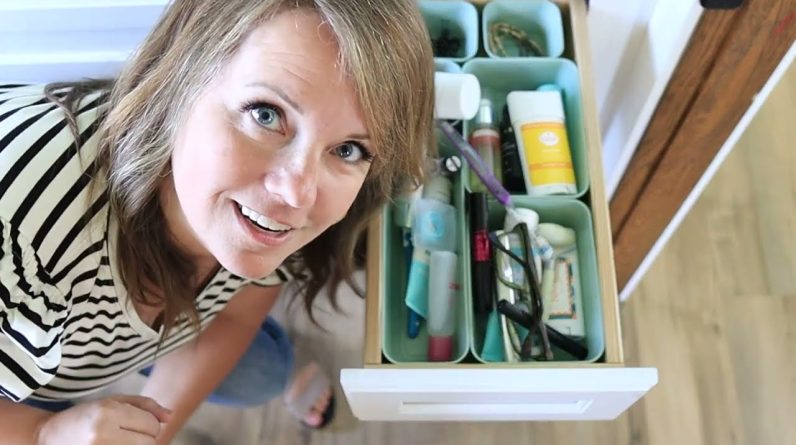
Are you a grandparent looking to tidy up your living space? Look no further! In this article, we will explore some easy decluttering tips specifically tailored for grandparents. With the principles of decluttering and minimalism in mind, you can create a more organized and peaceful home environment for yourself and your loved ones. From tackling sentimental items to downsizing collections, these straightforward tips will help you reclaim your living space and enjoy the benefits of a clutter-free life. So, let’s get started on this journey towards a more streamlined and stress-free living space!
Table of Contents
Getting Started
Set Clear Goals
Before you embark on your decluttering journey, it’s important to set clear goals for yourself. Take some time to think about what you hope to achieve with this process. Is your main goal to create a more organized living space? Are you looking to downsize and create a more minimalist lifestyle? Whatever your goals may be, write them down and refer back to them throughout your decluttering process. Having a clear vision will help you stay motivated and focused.
Create a Plan
Once you have set your goals, it’s time to create a plan of action. Break down the decluttering process into smaller, manageable tasks. This will prevent you from feeling overwhelmed and help you stay organized. Consider creating a decluttering schedule, allotting specific time slots each week for decluttering. Having a plan will make the process more structured and efficient.
Get the Whole Family Involved
Decluttering doesn’t have to be a solitary task. Getting the whole family involved can make the process more enjoyable and encourage bonding time. Assign different tasks to family members based on their strengths and interests. You can also turn decluttering into a fun family event by playing music, sharing stories, and rewarding yourselves with a special treat afterwards. Remember, decluttering is not just about getting rid of things; it’s about creating a more organized and harmonious living space for everyone.
Sorting and Organizing
Start with Small Tasks
To make the decluttering process more manageable, start with small tasks. This could be decluttering a single drawer, sorting through a stack of papers, or organizing a shelf. By tackling small tasks first, you can build momentum and gain a sense of accomplishment. As you continue to complete these smaller tasks, you’ll find yourself becoming more efficient and motivated to tackle larger areas.
Use the Four-Box Method
The four-box method is a simple and effective way to sort and declutter your belongings. Label four boxes or bins as “Keep,” “Donate,” “Sell,” and “Trash.” As you go through each room or area, place items into the appropriate box. Be ruthless when deciding what to keep and what to let go of. Remember, the aim is to create a clutter-free and organized living space. Once you have filled up the boxes, take action immediately by donating, selling, or disposing of them.
Categorize Belongings
Categorizing your belongings can make it easier to find and maintain an organized space. Start by grouping similar items together, such as books, clothes, electronics, or kitchenware. Once you have everything sorted into categories, determine the best storage solution for each group. This could include shelving units, storage bins, or drawer dividers. Having designated spaces for each category will make it easier to find and put away items in the future.
Use Labels and Containers
Labels are your best friend when it comes to staying organized. Invest in a label maker or simply use adhesive labels to identify the contents of your storage bins, drawers, and shelves. This will save you time and frustration when searching for specific items. Additionally, using clear containers can make it easier to see what is inside without having to open each one. By using labels and containers, you’ll maintain a clutter-free and well-organized living space.

This image is property of www.mydomaine.com.
Sentimental Items
Create a Memory Box
When decluttering, it can be difficult to let go of sentimental items. One solution is to create a memory box. This is a designated box where you can store items that hold special memories, such as photographs, letters, or mementos. By having a designated space for these sentimental items, you can keep them safe and organized while still maintaining a clutter-free living space.
Take Pictures
If you find it hard to part with certain sentimental items, consider taking pictures of them instead. Digital photos take up much less space than physical objects, yet still allow you to preserve the memory. Create digital albums or folders on your computer or smartphone to store these pictures. This way, you can revisit the memories without the physical clutter.
Pass Down Heirlooms
If you have heirlooms or sentimental items that hold deep meaning for you, consider passing them down to the next generation. Talk to your children or grandchildren about these items and their significance. By passing down these treasures, you are not only decluttering your own space but also keeping your family history alive. It’s a wonderful way to create a sense of connection and preserve memories for future generations.
Digital Decluttering
Organize Digital Photos
Just like physical photos, digital photos can quickly accumulate and become overwhelming. Take the time to organize your digital photo library by creating folders and labeling them appropriately. You can organize photos by year, event, or category. This will make it easier to locate specific photos in the future and prevent the digital clutter from overtaking your devices.
Delete Unnecessary Files
Over time, computers and smartphones can become filled with unnecessary files and documents. Take the time to go through your digital files and delete anything that is no longer needed. This includes old documents, duplicates, and outdated software. By freeing up digital space, you’ll not only declutter your devices but also improve their performance.
Unsubscribe and Declutter Emails
Email inboxes can quickly become overwhelmed with subscriptions, newsletters, and promotional emails. Take the time to unsubscribe from any email lists that you no longer find relevant or useful. Create folders or labels to organize important emails and delete spam or unnecessary messages. By decluttering your inbox, you’ll reduce digital distractions and make it easier to find and respond to important emails.
This image is property of embed.filekitcdn.com.
Donations and Recycling
Find Local Charities
When decluttering, you may come across items that are still in good condition but no longer serve a purpose in your life. Consider donating these items to local charities or organizations. Many charities accept donations of clothing, furniture, household items, and more. Research local organizations in your area and find out what items they accept and how you can donate them. Knowing that your items are going to a good cause can make parting with them easier.
Donate to Schools or Libraries
Schools and libraries often appreciate donations of books, educational materials, and supplies. If you have gently used or new items that are suitable for these institutions, consider reaching out to schools or libraries in your community. Your donations can help enrich the lives of students and foster a love for learning.
Sell or Consign Items
If you have items that are still in good condition and have some value, consider selling or consigning them. Online platforms such as eBay or Facebook Marketplace make it easy to sell items from the comfort of your home. Alternatively, you can consign items at local consignment stores or host a garage sale. Selling or consigning items not only helps declutter your space but also allows you to earn some extra money.
Recycle Responsibly
For items that are no longer usable or suitable for donation or sale, be sure to recycle them responsibly. Research the recycling guidelines in your area to ensure that you are properly disposing of these items. This could include electronics, expired medications, old batteries, or outdated appliances. By recycling responsibly, you’re doing your part to protect the environment and reduce waste.
Minimalist Living Spaces
Declutter the Living Room
The living room is often the heart of the home, and decluttering this space can have a significant impact on the overall feel of your living environment. Start by removing any items that don’t belong in the living room and find a proper place for them elsewhere. Then, declutter surfaces such as coffee tables and shelves by removing unnecessary items and keeping only essentials or decorative pieces that bring you joy. Consider investing in storage solutions such as ottomans with hidden compartments or wall-mounted shelves to maximize storage space.
Organize the Kitchen
A cluttered kitchen can make cooking and meal preparation stressful. Start by decluttering your countertops and removing any appliances or utensils that you don’t use regularly. Sort through your pantry and refrigerator, discarding expired or unused food items. Utilize drawer dividers and organizers to keep your cutlery, utensils, and cooking tools neatly arranged. Consider donating or selling any duplicate or unused kitchenware. By decluttering and organizing your kitchen, you’ll create a more functional and enjoyable space for mealtime.
Simplify the Bedroom
A cluttered bedroom can negatively impact your ability to relax and get a good night’s sleep. Start by decluttering your surfaces such as dressers, nightstands, and under-bed storage. Remove any items that don’t contribute to a restful environment. Consider investing in storage solutions such as under-bed storage containers or hanging shelves to maximize space. Simplify your wardrobe by donating or consigning clothing items that you no longer wear or love. By creating a clutter-free and serene bedroom, you’ll promote better sleep and relaxation.
Create Functional Storage
In order to maintain a clutter-free lifestyle, it’s crucial to have functional storage solutions. Evaluate your existing storage spaces and consider how you can maximize their efficiency. This may involve utilizing storage bins, shelves, or drawer dividers to keep similar items together and easily accessible. Consider multi-functional furniture pieces, such as ottomans with hidden storage compartments or coffee tables with built-in shelves. By creating functional storage solutions, you’ll make it easier to keep your living spaces organized and clutter-free.

This image is property of atozenlife.com.
Digital Solutions
Use Digital Albums
Digital albums are a great way to store and organize your digital photos. Many online platforms and applications allow you to create categorized albums, making it easy to locate specific photos. Take the time to transfer your photos to these digital albums and organize them by year, event, or category. This will not only help declutter your devices but also provide a convenient way to revisit and share your favorite memories with loved ones.
Scan Important Documents
In today’s digital age, scanning important documents is a great way to declutter your physical space. Scan documents such as insurance policies, medical records, or financial statements and save them as digital files. Organize these digital documents into folders or categories on your computer or cloud storage. This will not only reduce paper clutter but also make it easier to locate and access important documents when needed.
Use Online Storage
Cloud storage services provide a secure and convenient way to store files, photos, and documents digitally. Take advantage of these services to store and backup your important digital files. By utilizing online storage, you’ll not only free up space on your devices but also ensure that your files are protected in case of device loss or failure. Be sure to choose a reputable and secure cloud storage provider that meets your storage needs.
Letting Go of Guilt
Understand the Value of Letting Go
Letting go of possessions can be emotionally challenging, especially when they hold sentimental value. However, it’s important to understand that the value of an item is not solely based on its physical presence. The memories associated with an item will always remain, even if the item itself is no longer in your possession. By letting go of unnecessary belongings, you create space for new experiences and opportunities.
Focus on the Positives
When decluttering, it’s easy to focus on what you are giving up rather than what you are gaining. Shift your focus to the positive aspects of decluttering, such as the increased space, reduced stress, and improved organization. Remind yourself of the benefits that decluttering will bring to your life and embrace the process as a positive step towards a more fulfilling and clutter-free lifestyle.
Share Items with Loved Ones
If you find it difficult to part with certain items, consider sharing them with loved ones. Ask your family and friends if there are any specific items they would like to have or cherish. By passing down cherished belongings to loved ones, you are not only preserving the memory and sentimental value of the item but also creating a sense of connection and appreciation among your family and friends.

This image is property of atozenlife.com.
Maintaining a Clutter-Free Lifestyle
Establish Daily Habits
Maintaining a clutter-free lifestyle requires consistent effort and commitment. Establishing daily habits can help you stay organized and prevent clutter from piling up. Take a few minutes each day to tidy up, putting items back in their designated places and decluttering any areas that may have accumulated clutter. By making this a daily practice, you’ll prevent clutter from becoming overwhelming and create a more organized living environment.
Regular Decluttering Sessions
In addition to daily habits, regular decluttering sessions are essential to maintaining a clutter-free lifestyle. Set aside dedicated time each month to assess your living spaces and identify any areas that need decluttering or organizing. Focus on one area or category at a time to prevent overwhelm. By regularly decluttering, you’ll prevent clutter from accumulating and ensure that your living spaces remain organized and stress-free.
Avoid Impulse Buying
One of the main contributors to clutter is impulse buying. Before making a purchase, pause and ask yourself if the item is truly necessary and aligns with your goals and values. Consider if you have a designated space for the item and if it will bring long-term joy or usefulness. By practicing mindful consumption and avoiding impulse buying, you’ll prevent unnecessary items from entering your living spaces.
Making Decluttering a Family Event
Involve Grandchildren
Decluttering can be a wonderful opportunity to involve your grandchildren and teach them valuable life skills. Invite them to help with small decluttering tasks that are age-appropriate. This could be sorting toys, organizing a bookshelf, or helping with digital decluttering. Make it a fun and educational experience by explaining the importance of decluttering and the benefits it brings. By involving your grandchildren, you’ll not only create lasting memories but also instill in them the value of organization and minimalism.
Share Family Stories
Decluttering often leads to rediscovering forgotten treasures and family heirlooms. Take this opportunity to share family stories and memories with your loved ones. As you come across items that hold special significance, explain their history and the stories behind them. This not only adds a personal touch to the decluttering process but also helps preserve your family’s heritage and strengthens family bonds.
Create Memories Together
Decluttering doesn’t have to be a mundane task; it can be a chance to create special memories with your family. Plan breaks during the decluttering process to enjoy quality time together. Take a walk, have a picnic, or participate in an activity that everyone enjoys. By incorporating these enjoyable moments into the decluttering process, you’ll make it a family event to remember.
In conclusion, decluttering doesn’t have to be an overwhelming task. By setting clear goals, creating a plan, and involving your family, you can make the process enjoyable and rewarding. Take small steps, utilize effective sorting and organizing methods, and don’t forget to pay attention to sentimental items and digital clutter. Donate, recycle, and create minimalist living spaces that bring you peace and serenity. Embrace digital solutions and let go of guilt as you focus on the positives. Establish daily habits, hold regular decluttering sessions, and avoid impulse buying to maintain a clutter-free lifestyle. And finally, turn decluttering into a family event by involving your grandchildren, sharing family stories, and creating memories together. Happy decluttering and enjoy the benefits of a simplified and organized living space!

This image is property of balancethroughsimplicity.com.







